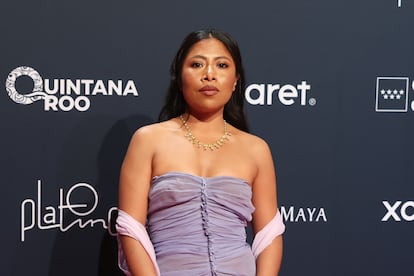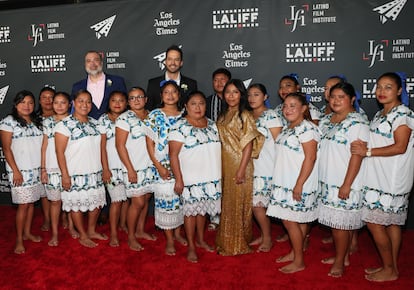Yalitza Aparicio: ‘When you get another perspective on life, you discover things you weren’t taught growing up’
The Mexican actress narrates ‘Las Amazonas de Yaxunah,’ a documentary about the revolutionary Mayan women’s softball team from Mexico’s Yucatan region

Yalitza Aparicio, 30, is currently a figure of note in Mexico and an icon of the Mexican indigenous heritage. Originally from Tlaxiaco, Oaxaca, her father is from a town in Santa Catarina Yosonotú, and her mother is from Joya del Mamey, in Putla.
Yalitza earned a degree in early childhood and preschool education, which allowed her to work as a preschool teacher until she made her film debut as Cleo in Alfonso Cuarón’s 2018 film Roma. Her role earned her an Oscar nomination for Best Actress, making her the first indigenous woman and the second Mexican woman to be nominated. In 2019, Time magazine included her in its list of the world’s 100 most influential people and, in October of that same year, she was named UNESCO Goodwill Ambassador for Indigenous Peoples.
In 2024, the Mexican actress returns to the big screen, but this time as the voice-over narrator on the documentary Las Amazonas de Yaxunah, which charts the inspiring journey of a team of 26 passionate female softball players, ranging from 13 to 62, who defy gender stereotypes and overcome immense challenges to pursue their passion. Premiered at the New York Latino Film Festival, the project is close to Aparicio’s heart. EL PAÍS talked to both the actress and the film’s director, Alfonso Algara.
Question. Alfonso, how did you come to direct this project?
Alfonso Algara. I was sent an article from The New York Times about a group of women in the Yucatecan jungle who were playing softball in traditional costumes, and I obviously thought it was a very beautiful, exciting story. The problem is there’s no phone signal there and no internet, so it was very difficult to get in touch with them. So I went to meet them and it was incredible.
Q. Yalizta, what was your reaction when you received the script to narrate the film?
Yalitza Aparicio. It came as a surprise because we had already been told that the director was not Mexican. My thoughts were that you’d have to be from the heart of the community to understand the women’s way of thinking. When I learned about Algara’s whole approach to getting along with them, gaining their trust and getting to know them better, that’s when I understood how he had this affection for them.
Q. Were you involved in the development of the script?
Y. A. It’s something that happened as we talked. We would be shooting and I would ask “What is the point of this bit? Let’s try this and see.” So, it was a case of suggesting and seeing what came out best.
Q. What was the biggest challenge during the filming process?
A. A. What I was most interested in was gaining their trust and that’s what I spent the most time on. I really made sure that my crew was involved, that they sat at the table with them, that we ate with them, that we slept in their hammocks, in their houses, that we played with their children, that everyone was on the same wavelength.

Q. What was your reaction when you saw the completed version?
Y. A. Wonderful. I think there were little things in it that I hadn’t seen before because what what I’d been sent hadn’t been edited yet. But when I saw the final version it was amazing to see how it had been developed. It was very impressive.
Q. What is the message you want people to take away from it?
Y. A. Progress is a team effort. You can’t get anywhere if there is no collaboration. I’ve heard it said that this documentary is only for the indigenous community, but how would this story have reached as many people as it has if Alfonso and the rest of the team had not believed in it? The other thing is the sense of solidarity among the women, the support they give each other, and how they are always looking forward. It is about the challenges we face and how we meet them with a warrior’s strength and keep going.
Q. How much of yourself did you see in these women’s stories?
Y. A. A lot. From the day I met these women, I started to think, “Of course, I went through that or I also thought that or I experienced that.”
Q. Is it hard for you to see that society still imposes limitations on women or that there are women clinging to the beliefs of the past?
Y. A. I understand it a bit, because I was one of those women who used to have a different way of thinking when I was in a similar place. I was always being told, “You are too old, you don’t have children, poor you.” But once I got out of there and into a different environment, all the women around me were saying things like, “I just came back from Paris and I went to London, I went to Los Angeles...,” and I asked them: “And your husband doesn’t say anything?” And they just looked at me in amazement.
When you get another perspective on life, you discover things you weren’t taught growing up. Nowadays, with social networks, with the media, it is easier to realize that, even as a woman, you have the right to study, you have the right to travel, to choose if you want to get married or not, to have children.... But if you are inside and locked up, or surrounded by these kinds of comments, it is complicated.
Sign up for our weekly newsletter to get more English-language news coverage from EL PAÍS USA Edition
Tu suscripción se está usando en otro dispositivo
¿Quieres añadir otro usuario a tu suscripción?
Si continúas leyendo en este dispositivo, no se podrá leer en el otro.
FlechaTu suscripción se está usando en otro dispositivo y solo puedes acceder a EL PAÍS desde un dispositivo a la vez.
Si quieres compartir tu cuenta, cambia tu suscripción a la modalidad Premium, así podrás añadir otro usuario. Cada uno accederá con su propia cuenta de email, lo que os permitirá personalizar vuestra experiencia en EL PAÍS.
¿Tienes una suscripción de empresa? Accede aquí para contratar más cuentas.
En el caso de no saber quién está usando tu cuenta, te recomendamos cambiar tu contraseña aquí.
Si decides continuar compartiendo tu cuenta, este mensaje se mostrará en tu dispositivo y en el de la otra persona que está usando tu cuenta de forma indefinida, afectando a tu experiencia de lectura. Puedes consultar aquí los términos y condiciones de la suscripción digital.








































